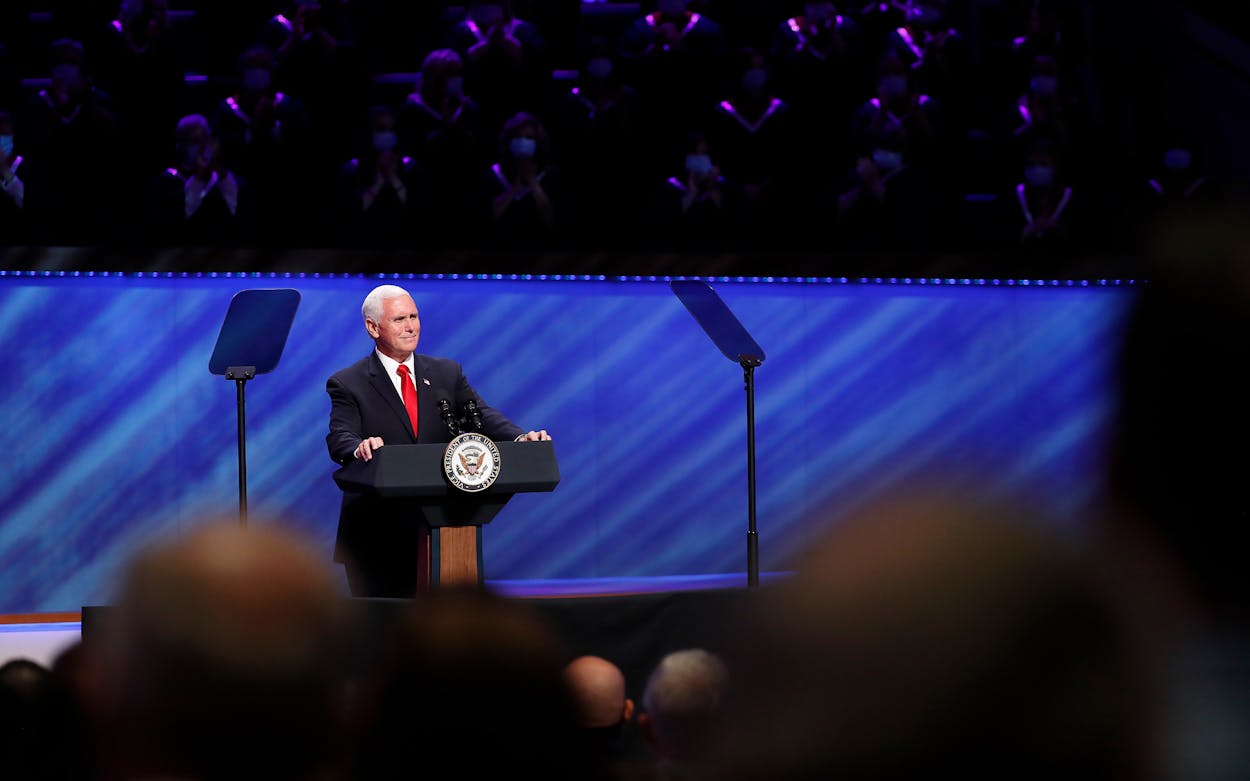Pastor Robert Jeffress, famed leader of the First Baptist Church in Dallas, held out hope in his Sunday service that President Donald Trump might be following along, finding his faith at long last. “Speaking of somebody who may be watching online,” Jeffress said in the middle of his sermon, “President Trump, we love you!”
A good shepherd never gives up on his flock. But the president wasn’t watching, of course. His public schedule put him at the Trump National Golf Club in Virginia from 8:50 a.m. to 1:19 p.m. Central time.
In the president’s stead, Jeffress was joined at Celebrate Freedom Sunday, a star-spangled, pro-Trump political rally at his megachurch, by the two members of the administration best beloved by Christian conservatives: Vice President Mike Pence, the keynote speaker, and Secretary of Housing and Urban Development Ben Carson. The two cabinet members, who also sit on the administration’s Coronavirus Task Force, went to Dallas because of a different contagion sweeping the country: the president’s approval numbers among white evangelical voters are ailing, having fallen from nearly 80 percent to around 62. (Pence also met with Governor Greg Abbott afterward to discuss the virus.)
In 2016, Trump would not have won the presidency without the support of white evangelicals, who desired above all else to fill the Supreme Court seat left by Antonin Scalia with a conservative as redoubtable as he. But this election cycle there’s no empty seat on the higher court, and, while abortion remains a potent poll-driver, there are other policies evangelicals care about. Trump’s threats of violence against George Floyd protesters, without distinguishing between lawful and unlawful ones, was called out by the normally unflappable televangelist Pat Robertson. That’s to say nothing of approval for the president’s handling of the COVID-19 pandemic, which is slipping among white evangelicals.
If Trump can’t get reelected without the support of evangelical voters, why isn’t he the one speaking to Jeffress’s flock? Perhaps because, years on, he still has no idea how to talk to worshippers. Asked in 2015 what his favorite book of the Bible was, Trump essentially said all of them. Recently, Trump deployed the national guard to clear up a path from the White House to nearby St. John’s church for a photo op, where he posed holding a Bible like a prizewinning fish. The event on Sunday—at which God was an ancillary figure at best—was an attempt to sell those watching on the proposition that Pence, trotted out in Trump’s place, was enough.
The celebration started with as much flag-hugging bluster as could be managed. A mechanical platform raised a considerable orchestra to the stage, which began playing an extended patriotic medley, including a slowed-down version of “America the Beautiful.” The members of the choir weren’t wearing masks; most in the audience were and waved hundreds of small American flags. At the song’s midpoint, an offstage voice boomed a warning: “As the words of patriots remind us of our blessings, they warn us of the consequences of taking liberty for granted.”
Then came a lengthy medley of military songs, followed by a recitation of the Pledge of Allegiance. After that, a man emerged on stage to promote Jeffress’s new book, Praying for America. Only then could the politics begin.
Carson came first. He ran through his accounting of the administration’s accomplishments, including economic growth and fighting a culture of dependency on welfare. “This crisis came on the back of a terr-” he said, catching himself, “actually a wonderful economy, a very strong foundation. We’re very fortunate for that.” But now we needed to learn to fight back, he said. “We must learn to dominate the virus and not let the virus dominate us.”
Then Jeffress took the stage to explain how Pence had been a driving force for good in the administration—despite the president. “Mike Pence is absolutely fantastic,” Jeffress recalled Trump saying. “He is opposite me in every way!” The audience laughed.
Jeffress didn’t reserve praise for Trump for too long. “Together, they have been able to enact the most pro-life, pro–religious liberty, pro-Israel, pro-conservative judiciary in the history of America!”
He concluded by holding out hope that evangelicals will get a just reward in 2024 for their support of Trump: President Pence. “We don’t want you to move out of the West Wing,” Jeffress told the vice president. “We just want you to move down the hall a few doors!”
When he took the stage, Pence thanked Jeffress for his “overly generous” praise. He launched into another recitation of the administration’s accomplishments and bold stands—touching on tax cuts, guns, and the comparative combat readiness of the Air Force fleet, which seemed a strange subject for a house of worship.
Throughout, Pence returned to a refrain: “The foundation of America is freedom, and the foundation of freedom is faith.” That foundation was cracking in many ways, Pence said. Among various threats the vice president identified, he noted that “tearing down statues is not free speech.” (Ironically, Pence’s speech began after the congregation sang the Union’s fight song, “The Battle Hymn of the Republic.”)
But for all the talk about patriotism and Old Glory and valor and sacrifice and the Air Force budget, there was a figure brought up only once: 125,000, the number of Americans dead so far from a virus that many other countries have essentially beaten back. Other speakers alluded to the dead, but only Pence quantified them—briefly, before working the crowd to an emotional climax with the story of his rebirth in Christ. The address landed: This is the vice president’s tribe. He’s knows what it wants to hear, and what it doesn’t.
Correction: The original version of this story incorrectly stated a man came on stage to urge viewers to purchase Jeffress’s new book. In fact, all guests were offered a free copy of the book as a gift. The story has been updated.
- More About:
- Politics & Policy
- Donald Trump








